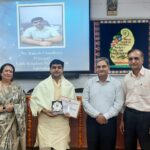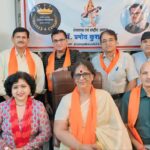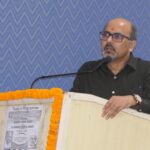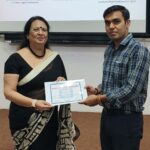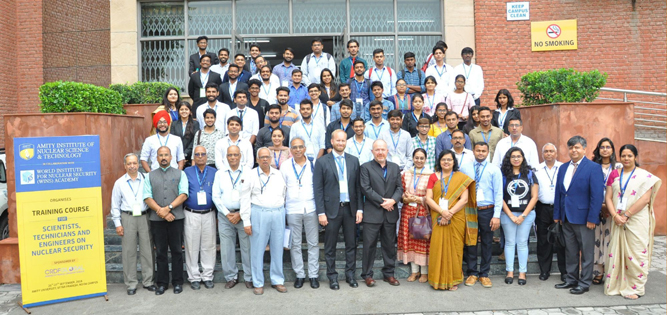
NOIDA. Amity School of Natural Resources and Sustainable Development (ASNRSD) commenced One-Week Compulsory Training Course on “Ecotourism and Livelihood and Forest Conservation” for IFS Officers sponsored by Ministry of Environment, Forest and ClimateChange (MoEFCC), Govt. of India at Amity University Uttar Pradesh, Noida Campus. 18 Senior IFS Officers from 12 statesincluding Bangalore, Karnataka, Sikkim, Jharkhand, Madhya Pradesh andUttrakhand amongst others have participated in the training programme Inauguratingthe course, Dr. Siddhant Das, IFS, Director General (Forests) and Special Secretary to Govt of India, Ministry of Environment, Forests and Climate Change said, “disaster is a combination of hazard and vulnerability. Hazard is nature caused like hurricane, cyclone, earthquake etc but vulnerability is caused due to negligence. To lessen the impact of disaster, it is important to manage the vulnerable areas. In present time, global warming and climate change are the worst disasters faced by the world.” He pointed out that in the process of development, humans started to burn fossil fuels which released carbon dioxide resulting in increase of concentration of green house gases in the atmosphere. He added that between years 1900-2000, the average temperature rise was 1.05 Degree Celsius and in the last 15 years the average temperature rise has been recorded at 1.06 Degree Celsius. Dr. Das remarked that if the temperature continues to rise and reach beyond 2 Degree Celsius then the destruction will be beyond the knowledge and control of even best of scientific minds. Hence, the world leaders and scientists have deliberated to cap the average rise to 1.05 Degree Celsius through nationally determined contributions. He called upon the all the stake holders especially the community to make collaborative efforts to avoid the devastating effects on already ravaged climate. Talking about United States of America exiting from The Paris Climate Agreement, Dr. Das shared that now India leads the climate action with Prime Minister of India committing towardscarbon sink of 2.5 to 3 billion tonnes of carbon dioxide-equivalent through additional forest and tree cover by 2030. Sharing his views on Eco-Tourism, Dr. Das highlighted the three componentsof eco-tourism including understanding that eco-tourism is about learning and education rather than just fun and frolic activity, promoting it in collaboration with local communities and lastly, considerate towards carrying capacity of the area. He apprised that soon an Eco-Tourism Policy will be proposed to the cabinet to streamline strategic sustainable growth and conservation. Addressing the issue of human-wildlife conflict, he mentioned that humans are invading the wildlife area hence wild animals are attacking in order to protect themselves. He further added that Tigers don’t attack humans deliberately until considered as potential threat but if a tiger becomes a man-eater then it gets necessary to kill it, seeing it as a threat to human lives. Briefing about the principles of Eco-Tourism, Dr. Vinay Luthra IFS (Retd.) Former, Principal, Chief Conservator of Forests, Karnataka said that the main principle is to limit the carrying capacity of the destination and tourism with intention of studying, admiring and learning about flora and fauna should promoted. He further added that the objective of eco-tourism is to lead for conservation of the forests and wildlife. Dr. Luthra stressed that if proper steps are not taken then eco-tourism can become mass tourism which will have adverse effect on forests. He opined that the need of the hour is to framework proper policies and guidelines to promote and sustain eco-tourism. Dr. Luthraaverred that India should take a cue fromcountries like Bhutan, Costa Rica and Europewho have initiated various steps to increase and conserve forest area such as 72% of Bhutan’s land is under forest cover, Costa Rica government is encouraging people to convert their farm areas to natural parks and Europe is working on ‘Rewilding Europe ‘ project. Addressingthe gathering, Dr. Balvinder Shukla, Vice Chancellor, Amity Universitysaid that Eco-tourism is one of the fastest growing segments of the TourismIndustry that has helped in environmental conservation, socioeconomicdevelopment and increase in employment and entrepreneurship at a local level.She emphasized that there is a need tocreate awareness amongst local people towards the promotion of eco-tourism withregards to culture and heritage also. She opined that participation of private players along with partnership amongst localcommunities, educational institutions and forest authorities is required forbetter support of the concept of eco-tourism. Dr. Nitin Batra, Sr. President, RBEF encouraged to synergize the minds and exchange ideas around frugal innovation, research and education for sustainable growth and conservation of forests. Dr. W Selvamurthy, President, Amity Science Technology and Innovation Foundation; Dr.S.P. Singh, IFS (Retd.) Director, ASNRSD, Amity University; Prof. B.K.P. Sinha,IFS (Retd.) Advisor, ASNRSD, Amity University and Mr. J.C. Kala, IFS (Retd.)Hony. Advisor, AIGWES, Amity University were also presentduring the occasion. Duringthe day, various technical sessions were conducted on topics such as Sustainable Community based Ecotourism in Chambal; Ecotourism: Overview, Principle and Practices and Ecotourism and Forest Conservation: Learning from Karnataka and International Ecotourism amongst others.

